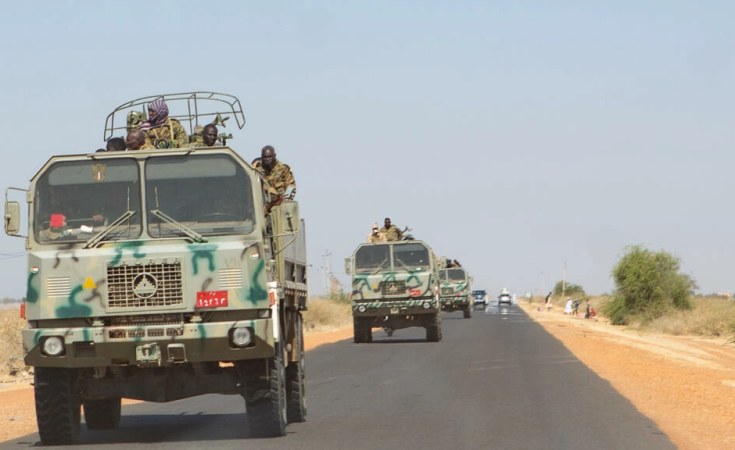The UN refugee agency has advised governments not to return people to Sudan amid an ongoing conflict there. Meanwhile, Arab ministers will meet in Cairo this weekend to discuss the fighting. DW has the latest.
The United Nations' refugee agency, UNHCR, said on Friday that it was telling governments not to return people to Sudan as fighting between two rival generals continues to rage.
"We're advising governments not to return people to Sudan because of the conflict that's going on there," Elizabeth Tan, UNHCR's director of international protection, told reporters at a briefing in Geneva.
"This applies to Sudanese nationals, to foreign nationals, including refugees who are being hosted in Sudan, stateless persons, as well as those who do not have a passport or any other form of identification," Tan said.
Witnesses said the Sudanese capital, Khartoum, has been hit by further airstrikes and gunfire on Friday in fighting that has killed hundreds and caused almost half a million people to flee their homes.
About 100,000 of those have fled Sudan to neighboring countries, the United Nations says.
The UNHCR said on Thursday said it was preparing for 860,000 people to leave Sudan. It said $445 million (Ꞓ404 million) would be needed to support them just up to November.
Even before the conflict broke out, some 15 million people -- a third of Sudan's population -- were in need of food aid, according to UN estimates.
The clashes broke out in mid-April, pitting forces loyal to Sudan's de facto leader, Abdel-Fattah Burhan, who leads the regular army against those of his deputy, Mohammed Hamdan Dagalo, known more commonly as Hemeti.
Hemeti commands the paramilitary Rapid Support Forces (RSF), which are descended from the notorious Janjaweed militias that have been accused of committing atrocities during the Darfur conflict two decades ago.
The current fighting has persisted despite threats of US sanctions and multiple truces that have been agreed during the three weeks of battles so far.
Here are other key headlines about the crisis in Sudan for Friday, May 5
UN special representative warns of possible spread of conflict
The conflict in Sudan could lead to further violence in the surrounding region, according to Volker Perthes, the UN special representative for Sudan and head of the UN UNITAMS mission.
Perthes told DW that two factors could contribute to destabilizing the region: first, the flows of refugees and, secondly, the influx of fighters into Sudan who are looking to profit from the conflict.
He however declined to confirm reports that the Russian mercenary group Wagner was involved in the Sudan conflict. He also downplayed the reported involvement of Libyan General Khalifa Hifter, saying only that Hifter supported "one of the two parties but has no major role in this war."
He said the UN was working to prevent the war becoming a prolonged conflict.
"Our aim is to prevent exactly that: that there is a long war that could bring the country to the brink," he said, adding that a monitored cease-fire would have to be the first step in resolving the conflict.
Arab ministers to convene in Cairo amid prolonged conflict
Diplomats from nations in the Arab League will meet in Cairo this weekend, with the conflict in Sudan at the top of the agenda, according to Arab League spokesperson Gamal Rushdy.
The Arab countries hold different views on the conflict. Egypt, for example, is a staunch backer of the Sudanese Army, whereas the UAE is favorable towards the Rapid Support Forces (RSF).
UN warns of large number of child casualties
The United Nations has said it has received reports indicating the seven children were been killed or injured every hour in the Sudan conflict.
"As feared and as warned, the situation in Sudan has become fatal for a frighteningly large number of children," James Elder, spokesman for the UN children's agency UNICEF, told reporters in Geneva.
He said his agency had received reports from a trusted partner that 190 children had been killed and 1,700 injured in the first 11 days of the conflict alone. The reports have not yet been independently verified by the UN, he said, adding, however, that the real number was likely to be much higher.
Refugee flow likely to heavily impact South Sudan: UNHCR representative
South Sudan, one of the main destinations for people fleeing the conflict in Sudan, is likely to struggle to host the large number of refugees, according Marie-Helene Verney, the UNHCR representative in South Sudan.
Verney told DW that refugees started arriving to South Sudan two weeks ago.
"The first week was quiet because people were stuck in Khartoum and really could not leave Khartoum because the fighting was too hard," she said.
She said the UNHCR had recorded 33,000 people coming through one particular border crossing point into South Sudan over the past two weeks but that the real number was likely much higher.
There are about 800,000 South Sudanese who are refugees in Sudan, and the vast majority of those coming back are these refugees, Verney explained.
"So in a way, they're coming back home. But the return was not prepared at all," she said.
Verney said that much of South Sudan was already suffering from a high degree of food insecurity, meaning that the country would have great difficulties assisting the refugees.
In addition, she said South Sudan was largely reliant on its northern neighbor for food, basic goods and oil transit.
"So there's also a huge economic impact on South Sudan that is likely to play out in the next few weeks and months," Verney said.
tj/wd (AFP, Reuters)


